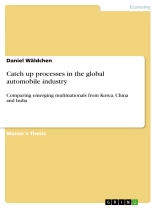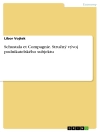Master’s Thesis from the year 2012 in the subject Business economics – Miscellaneous, grade: 1, 2, Berlin School of Economics and Law, language: English, abstract: This thesis seeks to contribute to the discussion on latecomer firms by gaining insights into the catch up processes of five automobile companies in the passenger car segment, namely BYD (PRC), Chery (PRC), Geely (PRC), Tata Motors (India) and Mahindra & Mahindra (India). Based on learning theories and the core processes of automobile manufacturers, the thesis develops a catch up framework to systematically compare automobile latecomers. Korean automobile manufacturer Hyundai serves as an example for successful catch up and provides a contextual framing for catch up processes in the automobile sector. An analysis of empirical data provides evidence for the evaluation of the catch up status of the five challenger firms. The author emphasizes the influence of institutional settings in China and India and the role of business groups which both can act as facilitators for the catch up process. Finally, the thesis clusters the catch up strategies of the five observed companies in order to compare their approach. The results indicate that the observed automobile latecomers have not achieved a sophistication level comparable to incumbents in terms of capabilities. However, opportunities to accelerate the capability building process exist. Latecomers can leapfrog through partnering, acquisitions or changing the rules of the game in the industry.
Daniel Wäldchen
Catch up processes in the global automobile industry [PDF ebook]
Comparing emerging multinationals from Korea, China and India
Catch up processes in the global automobile industry [PDF ebook]
Comparing emerging multinationals from Korea, China and India
Cumpărați această carte electronică și primiți încă 1 GRATUIT!
Limba Engleză ● Format PDF ● ISBN 9783656317456 ● Mărime fișier 3.5 MB ● Editura GRIN Verlag ● Oraș München ● Țară DE ● Publicat 2012 ● Ediție 1 ● Descărcabil 24 luni ● Valută EUR ● ID 3958635 ● Protecție împotriva copiilor fără












